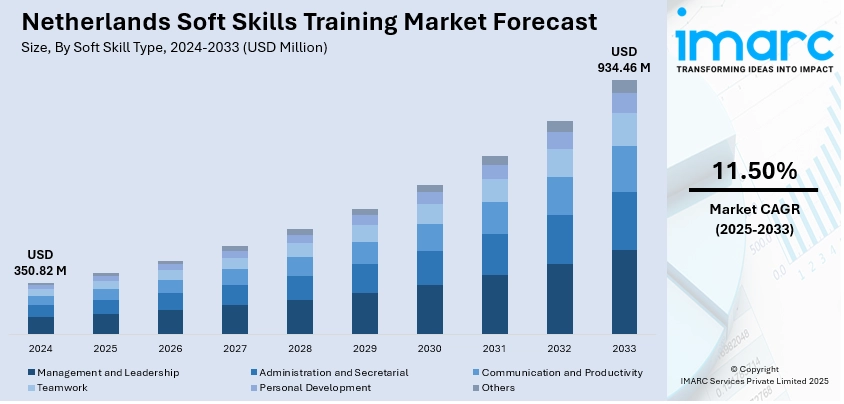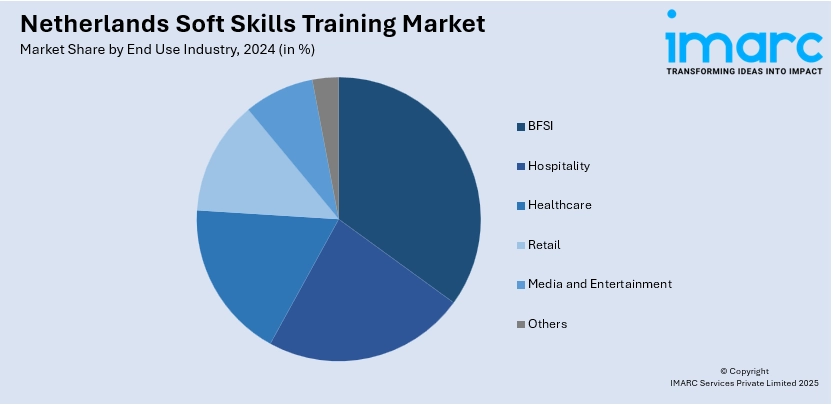
Netherlands Soft Skills Training Market Size, Share, Trends and Forecast by Soft Skill Type, Channel Provider, Sourcing, Delivery Mode, End Use Industry, and Province, 2025-2033
Netherlands Soft Skills Training Market Overview:
The Netherlands soft skills training market size reached USD 350.82 Million in 2024. Looking forward, IMARC Group expects the market to reach USD 934.46 Million by 2033, exhibiting a growth rate (CAGR) of 11.50% during 2025-2033. The increasing demand for an adaptable workforce to meet the changing requirements of the contemporary workplace is impelling the market growth. Moreover, the addition of soft skills in educational curriculum is supporting the market growth. Apart from this, the rise of remote working and virtual teams is expanding the Netherlands soft skills training market share.
|
Report Attribute
|
Key Statistics
|
|---|---|
|
Base Year
|
2024 |
|
Forecast Years
|
2025-2033
|
|
Historical Years
|
2019-2024
|
| Market Size in 2024 | USD 350.82 Million |
| Market Forecast in 2033 | USD 934.46 Million |
| Market Growth Rate 2025-2033 | 11.50% |
Netherlands Soft Skills Training Market Trends:
Growing Demand for Workforce Flexibility
The Netherlands market is driven by the heightened need for an adaptable workforce to meet the changing requirements of the contemporary workplace. Companies are concentrating on enhancing employees' communication, problem-solving, and leadership skills to drive productivity and innovation. As technology and business landscapes change rapidly, companies are giving importance to soft skill development to ensure employees are equipped with the skillset to meet emerging challenges. Companies are investing in training initiatives that foster interpersonal abilities, emotional intelligence, and teamwork so workers can excel in diverse and dynamic team environments. With industries increasingly valuing these non-technical skills, there is a major shift toward incorporating soft skills into routine professional development activities. This ongoing trend is shaping the growth of the market as businesses continuously seek ways to maintain a competitive edge through well-rounded, agile talent.

To get more information on this market, Request Sample
Integration of Soft Skills in Education Systems
The integration of soft skills in educational curriculum is supporting the Netherlands soft skills training market growth. Educational institutions and schools are placing greater emphasis on non-cognitive skills like communication, teamwork, and critical thinking to equip students with the skills for success in the workplace. This transformation towards holistic learning is causing an early emphasis on soft skills training, with multiple organizations incorporating these skills into their curriculum and extracurricular activities. Schools are getting involved with companies to make their students not only technically proficient but also people-friendly so that they can succeed in the workforce. As the trend gathers more pace, both professionals and students are resorting to specialized training providers to fine-tune their soft skills further, leading to an increasing demand for similar services throughout the nation. In 2025, EIT Digital unveiled the (d)Academy, an innovative digital skills platform created to tackle the pressing shortage of digital talent throughout Europe. Furthermore, the (d)Academy utilizes skills and knowledge from the EIT Digital Master School, enhancing its influence on the education-to-employment pathway. Central to the platform is a unique AI algorithm that analyzes both the CVs and the courses, pinpointing the essential hard and soft skills required to match candidates’ profiles with contemporary industry needs.
Increase of Remote Work and Virtual Team Collaboration
The growth of remote working and virtual teams is positively influencing the market. In 2025, the maximum tax-free allowance for remote work will rise by 2.13%, going from EUR 2.35 to EUR 2.40 net per day. Should a greater allowance be given for remote work, income tax and social security contributions need to be deducted from the amount that goes beyond EUR 2.40. With more firms adopting flexible working, employees need to adjust their communication and collaboration methods to new, online environments. Being able to effectively communicate using virtual systems, manage time for themselves, and establish trust within virtual teams is becoming paramount. Organizations are becoming aware of the necessity for training programs that provide their employees with the skills to succeed within remote workplaces, such as virtual leadership, digital communications, and conflict resolution. While remote and hybrid work models continue to grow, companies are spending on soft skills training to guarantee that their employees are able to work effectively and remain in good relationships regardless of the geographical distance. This change is driving the demand for soft skills training with a focus on the requirements of remote work.
Netherlands Soft Skills Training Market Segmentation:
IMARC Group provides an analysis of the key trends in each segment of the market, along with forecasts at the country and regional levels for 2025-2033. Our report has categorized the market based on soft skill type, channel provider, sourcing, delivery mode, and end use industry.
Soft Skill Type Insights:
- Management and Leadership
- Administration and Secretarial
- Communication and Productivity
- Teamwork
- Personal Development
- Others
The report has provided a detailed breakup and analysis of the market based on the soft skill type. This includes management and leadership, administration and secretarial, communication and productivity, teamwork, personal development, and others.
Channel Provider Insights:
- Corporate/ Enterprise
- Academic/ Education
- Government
The report has provided a detailed breakup and analysis of the market based on the channel provider. This includes corporate/ enterprise, academic/ education, and government.
Sourcing Insights:
- In-house
- Outsourced
The report has provided a detailed breakup and analysis of the market based on the sourcing. This includes in-house and outsourced.
Delivery Mode Insights:
- Online
- Offline
The report has provided a detailed breakup and analysis of the market based on the delivery mode. This includes online and offline.
End Use Industry Insights:

- BFSI
- Hospitality
- Healthcare
- Retail
- Media and Entertainment
- Others
A detailed breakup and analysis of the market based on the end use industry have also been provided in the report. This includes BFSI, hospitality, healthcare, retail, media and entertainment, and others.
Province Insights:
- Noord-Holland
- Zuid-Holland
- Noord-Brabant
- Gelderland
- Utrecht
- Others
The report has also provided a comprehensive analysis of all the major regional markets, which include Noord-Holland, Zuid-Holland, Noord-Brabant, Gelderland, Utrecht, and others.
Competitive Landscape:
The market research report has also provided a comprehensive analysis of the competitive landscape. Competitive analysis such as market structure, key player positioning, top winning strategies, competitive dashboard, and company evaluation quadrant has been covered in the report. Also, detailed profiles of all major companies have been provided.
Netherlands Soft Skills Training Market Report Coverage:
| Report Features | Details |
|---|---|
| Base Year of the Analysis | 2024 |
| Historical Period | 2019-2024 |
| Forecast Period | 2025-2033 |
| Units | Million USD |
| Scope of the Report |
Exploration of Historical Trends and Market Outlook, Industry Catalysts and Challenges, Segment-Wise Historical and Future Market Assessment:
|
| Soft Skill Types Covered | Management and Leadership, Administration and Secretarial, Communication and Productivity, Teamwork, Personal Development, Others |
| Channel Providers Covered | Online, Offline |
| Sourcings Covered | In-house, Outsourced |
| Delivery Modes Covered | Online, Offline |
| End Use Industries Covered | BFSI, Hospitality, Healthcare, Retail, Media and Entertainment, Others |
| Provinces Covered | Noord-Holland. Zuid-Holland, Noord-Brabant, Gelderland, Utrecht, Others |
| Customization Scope | 10% Free Customization |
| Post-Sale Analyst Support | 10-12 Weeks |
| Delivery Format | PDF and Excel through Email (We can also provide the editable version of the report in PPT/Word format on special request) |
Key Questions Answered in This Report:
- How has the Netherlands soft skills training market performed so far and how will it perform in the coming years?
- What is the breakup of the Netherlands soft skills training market on the basis of soft skill type?
- What is the breakup of the Netherlands soft skills training market on the basis of channel provider?
- What is the breakup of the Netherlands soft skills training market on the basis of sourcing?
- What is the breakup of the Netherlands soft skills training market on the basis of delivery mode?
- What is the breakup of the Netherlands soft skills training market on the basis of end use industry?
- What is the breakup of the Netherlands soft skills training market on the basis of province?
- What are the various stages in the value chain of the Netherlands soft skills training market?
- What are the key driving factors and challenges in the Netherlands soft skills training market?
- What is the structure of the Netherlands soft skills training market and who are the key players?
- What is the degree of competition in the Netherlands soft skills training market?
Key Benefits for Stakeholders:
- IMARC’s industry report offers a comprehensive quantitative analysis of various market segments, historical and current market trends, market forecasts, and dynamics of the Netherlands soft skills training market from 2019-2033.
- The research report provides the latest information on the market drivers, challenges, and opportunities in the Netherlands soft skills training market.
- Porter's five forces analysis assist stakeholders in assessing the impact of new entrants, competitive rivalry, supplier power, buyer power, and the threat of substitution. It helps stakeholders to analyze the level of competition within the Netherlands soft skills training industry and its attractiveness.
- Competitive landscape allows stakeholders to understand their competitive environment and provides an insight into the current positions of key players in the market.
Need more help?
- Speak to our experienced analysts for insights on the current market scenarios.
- Include additional segments and countries to customize the report as per your requirement.
- Gain an unparalleled competitive advantage in your domain by understanding how to utilize the report and positively impacting your operations and revenue.
- For further assistance, please connect with our analysts.
 Request Customization
Request Customization
 Speak to an Analyst
Speak to an Analyst
 Request Brochure
Request Brochure
 Inquire Before Buying
Inquire Before Buying




.webp)




.webp)












